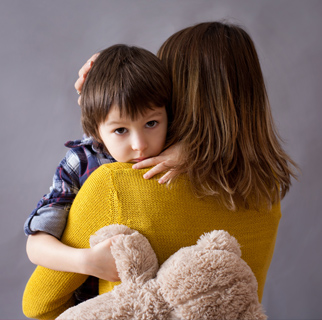Separation Anxiety

What is separation anxiety?
Part of a baby's normal development is learning that separations from parents are not long-term (permanent). Young babies don't understand time, so they think a parent who walks out of the room is gone forever. They have not yet developed the idea that a hidden object is still there (object permanence). Babies can become anxious and fearful when a parent leaves their sight. Separation anxiety is usually at its peak between 10 and 18 months. It typically ends by the time a child is 3 years old.
What are the signs of separation anxiety?
Babies with separation anxiety fear that a parent will leave and not return. The fear may get worse when a stranger is present. Typical responses of babies with this normal phase of development may include:
Crying when you leave the room
Clinging or crying, especially in new situations
Awakening and crying at night after previously sleeping through the night
Refusal to go to sleep without a parent nearby
How can you help your child with separation anxiety?
Children who feel secure are better able to handle separations. Cuddling and comforting your child when you are together can help him or her feel more secure. Other ways to help your child with separations include:
Comfort and reassure your child when he or she is afraid.
At home, help your baby learn independence by allowing them to crawl to other safe rooms for a short period of time alone.
Tell your baby if you are going to another room and that you will be back. Then come back.
Plan your separations when your baby is rested and fed. Try not to do them before a nap or meal.
Introduce new people and places gradually. Give your baby time to get to know a new care provider.
Don't prolong good-byes. Have the sitter distract your baby or child with a toy as you leave.
Introduce an object such as a blanket or soft toy to help ease separations.
For night awakenings, comfort and reassure your child by patting and soothing. Try not to let your child get out of bed.
Connect with us:
Download our App: